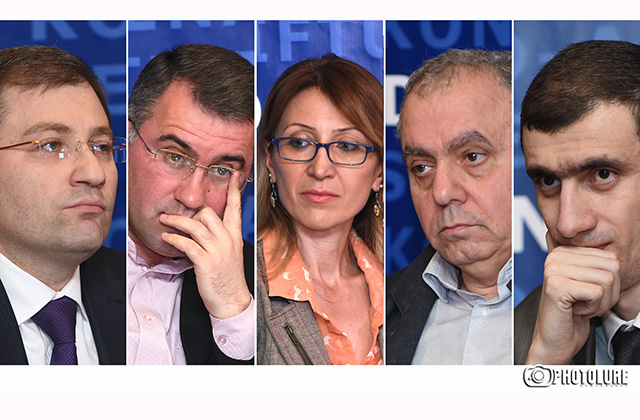What economic programs do the political powers propose?

Ahead of the April 2 parliamentary elections in Armenia, Konrad Adenauer Stiftung (KAS) foundation has planned a series of events dedicated to the platforms of political forces running for Parliament.
During the first meeting the political parties introduced their economic-political program provisions. Participants of the debate were David Sargsyan, RPA member, Mesrop Arakelyan, Tsarukyan bloc representative, Mane Tandilyan, member of “Yelk” bloc, Hrant Bagratyan, candidate for the PM of “Free Democrats” party and Armen Martirosyan, ORO representative.
D.Sargsyan stated that RPA program generally is anchored on 4 main points— continuous provision of macroeconomic and financial stability, creation of conditions for investment environment and provision of investments, support, stimuli and equal competition conditions for businesses, economic initiatives, SMEs.
Replying to the question of Satik Seyranyan, editor-in-chief of “168 Hours” newspaper, author and TV host of R-Evolution Political TV show at Armenia TV, why RPA showed a modest figure for economic growth—3.2%, David Sargsyan said for 2017 target will be 3.2%. “However, we also fix, that 2017 is going to be a year of more stabilization and we’ll come to the mid-term economic growth, which is going to be a target for us next year. We also state that in a mid-term perspective economy growth target index will be 5-6%,” D.Sargsyan said.
In her turn, M.Tandilyan stated that the program introduced by “Yelk” alliance introduces not what, but how. Accentuations, in her words, are put on steps. Based on her assessment under corruption, current judiciary system economy can’t develop, thus, after works in these fields it’ll be possible to pass on to economy recovery. She stated that it’s a key approach: middle class should be restored, as it’s the basis for economy development, its enlargement, regarding both quality and quantity, and in Armenia polarization is taking place.
“We need first, restore existence of middle class, start creating it, there are mechanisms, leverages, which we have touched upon in the program. Privileges provided to SMEs are involved as well,” Tandilyan said. According to ORO representative Armen Martirosyan their pre-election program is wide, involving SMEs, mining, heavy and light industries, agriculture, IT. To the question how much program implementation will comprise per year to understand whether it’s realistic or not, A.Martirosyan said there is no calculation for expenditures, as it’s impossible to totally calculate it. However, in his words it can be clearly stated that the steps they planned won’t do any harm to the budget, but will only add it.
According to M.Arakelyan, as a result of current policy trust crisis has developed in Armenia, due to which worsening of main macroeconomic indices is recorded, greater part of the population has serious issues linked to well-being, more than 1 million poor population.
“Program of the alliance is comprised of two parts. We propose implementation of 15 priority points, which will provide the opportunity to somewhat settle issues linked to social well-being, in particular, we propose raising of pensions and minimum salaries, drop in price for electricity and gas, 3-year tax privilege for small business regarding all types of taxes, amnesty of loan penalties comprising 60 billion. The mentioned programs are measurable, subject and may be implemented in a short period. In the period of this year it’s possible to provide certain well-being, which will provide the opportunity to record some activeness,” Arakelyan said.
Hrant Bagratyan, candidate for PM of “Free Democrats”, said the country is in collapse, the country is insolvent, and is taking new debts to make both ends meet, moreover, new round of debts will come after the elections. They have developed macroeconomic variables, springs. According to him, first, investments should be added, particularly on account of internal savings. The second important change according to H.Bagratyan is that financial integrity should be provided to the cities, community municipalities.
The third, according to him is decentralization: specific gravity of small business should comprise 70% of GDP, as in that case it’ll be able to change rapidly.
By Araks Martirosyan

























